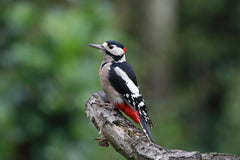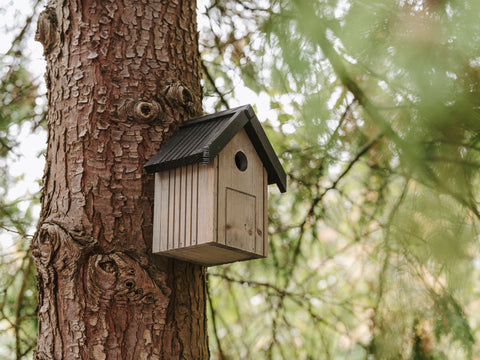Create a new home for the birds in your garden by taking part in National Nest Box Week 14-21 February.
This event encourages householders to put up nest boxes in time for breeding birds which will be looking for a safe place to lay their eggs. This is because natural nest sites for birds, such as holes in trees or old buildings are disappearing quickly.
All you need to do is buy a nest box and put it up in your garden. Read our tips below for the perfect place to site a nest box in your garden
You can create the ideal nesting location for the birds in your garden by:
1. Always choose a high quality nest box
When choosing a nest box, it’s a good idea to go for the best quality you can get, as it’s vital the box is a safe haven for young chicks. All of our Peckish nest boxes are designed to BTO standards to ensure the correct level of insulation for young and breeding birds.
Our nest boxes are also made from FSC® certified timber, so you can be sure that you are choosing a sustainable option for wild birds to nest in.
2. Position away from predators
Make sure cats and squirrels cannot get into the box. Install it high up (at leat 2-3m) above the ground. Read our article about choosing the ideal nesting location.
3. Think about the weather
Shelter from wind, rain and direct sunlight. The front of the nest box should be angled slightly downwards to prevent rain from entering.
5. Secure it safely
Use galvanised or stainless steel screws which will not rust to secure the nest box. This will ensure it’s safe and sturdy for many years to come! Just remember to regularly inspect the fittings.
6. A good diet is key
Keep feeders topped up with bird food to cater for the increased appetite of hungry chicks. A bird food, such as Peckish Extra Goodness Crumble Mix that contains plenty of energy for birds to successfully rear and provide for their chicks! It also contains added Calvita®, a supplement unique to Peckish containing calcium for healthy egg shells and the formation of strong bones and beaks.
7. Consider hygiene
Tiny chicks are susceptible to diseases spread between birds. We recommend that old nests be removed in the autumn, from September onwards once the birds have stopped using the box.
Use boiling water and let the box dry out thoroughly before replacing the lid. Insecticides and flea powders must not be used.
8. Make sure you can see it
After all your hard effort, it would be shame if you couldn’t enjoy the view! Make sure the nest box is somewhere close to a window, so you can see the activities in the spring.
Which nest box should you use for each type of bird?
Blue Tit

Prefer 25mm hole. Site box 1m to 5m above ground with clear flight path to entrance
Suggested Boxes - Peckish Garden Nest Box & Peckish Everyday Nest Box
Great Tit

Prefer 28mm hole. Site box 1m to 5m above ground with clear flight path to entrance.
Suggested Boxes - Peckish Garden Nest Box & Peckish Everyday Nest Box
Coal Tit

Prefer 25mm hole with box low down (less than 1m to ground)
Suggested Boxes - Peckish Garden Nest Box & Peckish Everyday Nest Box
Long-Tailed Tit

Tend not to use nest boxes.
House Sparrow

32mm hole with box over 2m above ground. They nest colonially so one box on own is unlikely to attract a pair.
Suggested Boxes - Peckish Garden Nest Box & Peckish Everyday Nest Box
Chaffinch

Chaffinches, or any other member of the finch family for that matter, won’t use a bird box, preferring to build their own nest in the fork of a tree.
Goldfinch

Goldfinches, or any other member of the finch family for that matter, won’t use a bird box, preferring to build their own nest in the fork of a tree.
Nuthatch

32mm hole with box sited over 3m high with clear flight path to entrance
Suggested Box - Peckish Garden Nest Box
Dunnock

Due to the fact that dunnocks like to sleep and nest close to the ground, they don't often use nest boxes. They may, however, use an open fronted nest box if it is not too high.
Bullfinch

Bullfinches, or any other member of the finch family for that matter, won’t use a bird box, preferring to build their own nest in the fork of a tree.
Pied Wagtail

Site box up to 5m above ground. Best sited where lawn and water are nearby.
Suggested Box - Peckish Garden Nest Box
Robin

Try to position the box in thick overhanging vegetation with good cover.
Suggested Box - Peckish Everyday Nest Box
Spotted Flycatcher

Site box 2m-4m above ground with clear outlook but some cover around box.
Suggested Box - Peckish Garden Nest Box
Swift

Place the nest box as high as possible on the building with a clear drop below.
Suggested Box - Peckish Garden Nest Box
Greenfinch

Greenfinches, or any other member of the finch family for that matter, won’t use a bird box, preferring to build their own nest in the fork of a tree.
Starling

Ideally over 2.5m above ground. Starlings are semi colonial so if you can put up a couple on adjacent trees or building you may find they all get occupied.
Suggested Box - Peckish Garden Nest Box
Song Thrush

For open fronted boxes, these are used by species which like to nest in fairly dense undergrowth, and include robin, blackbird and song thrush
Suggested Box - Peckish Everyday Nest Box
Blackbird

For open fronted boxes, these are used by species which like to nest in fairly dense undergrowth, and include robin, blackbird and song thrush.
Suggested Box - Peckish Everyday Nest Box
Wrens

For open fronted boxes, these are used by species which like to nest in fairly dense undergrowth, and include robin, blackbird and song thrush.
Suggested Boxes - Peckish Garden Nest Box & Peckish Everyday Nest Box
Siskin

Put your nest box about head height. The entrance to the box should not be obscured by foliage so try to keep any climbing plants well trained around the box.
Suggested Box - Peckish Garden Nest Box
Great Spotted Woodpecker

Great Spotted Woodpeckers do not require a nest box. They place their nests in both live and dead trees, sometimes in the tree trunk and sometimes in larger limbs on the trees.
Woodpigeon

Prefer not to use nest boxes.
Magpie

Prefer not to use nest boxes.
Jackdaw

Prefer not to use nest boxes.
Peckish Nest Boxes
Peckish Garden Bird Nest Box
Peckish Everyday Nest Box
Peckish Everyday Nest Box and Peckish Garden Nest Box




